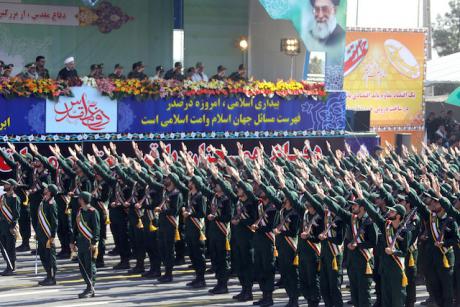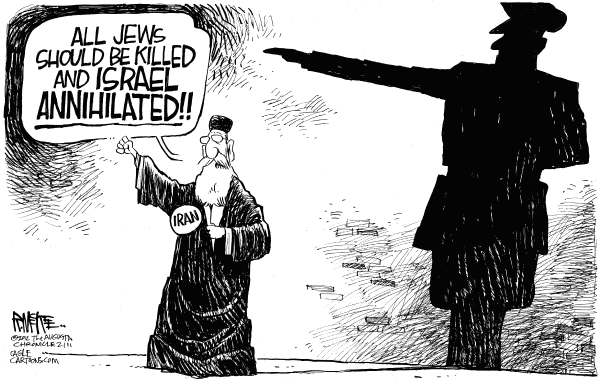
At the annual official ceremony Wednesday night commemorating Yom Hashoah, at Yad Vashem in Jerusalem, Prime Minister Benjamin Netanyahu spoke and took the opportunity to compare the world today to the world before the beginning of World War II.
He spent most of his speech attacking the framework agreement with Iran, saying the world was ignoring the terrible evil that is the Iranian agreement. They are, he said, “looking the other way, just as they looked the other way as Hitler came to power and began in his expansionist ways.”
Netanyahu referred to a meeting he had had with a Holocaust survivor, who said to him: “You must make sure there is never another Holocaust.” The Prime Minister replied: “That is exactly what I see as my prime responsibility.”
On Thursday in Tel Aviv, at 11 a.m. (as in all of Israel), the sirens that have been silent since the summer will wail once again, to mark Yom Hashoah,Israel’s National Day of Holocaust Commemoration. On Wednesday night, all restaurants and places of entertainment were closed. Standard television broadcasts were replaced by shows touching on various aspects of the Holocaust.
Next Tuesday night, these rituals will all be repeated a second time, with events to commemorate Yom Hazikaron, Israel’s National Memorial Day, honoring the memory of the soldiers and civilians who died in Israel’s wars, and in the numerous terror attacks carried out between wars.
Our national mourning all comes to a sharp and cathartic end the following day, when Israel’s Independence Day is celebrated throughout the streets and broadcast from our rooftops, amidst fireworks and continuous parties. It is impossible to understand Israel without understanding each of these events and their centrality to Israeli identity today—and to some extent how these collective commemorations and celebrations affect Israeli politics.
Yom Hashoah, commemorating the murder of six million Jews at the hands of Nazi Germany during World war II, was not always observed in Israel. During the first years of the Jewish state there were limited ceremonies in memory of the six million. At that time, the whole question of the Holocaust was hardly discussed.
The first widespread commemorative ceremonies in this country began on Kibbutzim, which served as homes to large numbers of Holocaust survivors.Kibbutz Lochamei HaGeta’ot, a kibbutz whose founding members included survivors of the Warsaw Ghetto uprising, led those memorial efforts.
The trial of Adolf Eichmann in Jerusalem in 1963 was an important milestone, opening up a large-scale national discussion on the Holocaust (which began to take on greater significance after that time).
The Holocaust gained greater importance in Israel in the late 1970s, with the rise to power of Likud and Menachem Begin, who himself had escaped from Nazi occupied Europe. In the nearly 40 subsequent years, Holocaust education has become increasingly more central in the Israeli educational curriculum—and now includes a nearly mandatory trip to Poland to visit the death camps.
The juxtaposition of Holocaust Memorial Day followed one week later by Memorial Day to Israel’s fallen (a day of even greater solemnity, in which more than 24,000 Israelis who gave their lives are remembered) serves as a stark reminder to the average Israeli that while events of the Holocaust may be starting to fade into a somewhat distant past (now 70 years), Jews continue to be hunted and killed by those who hate us.
The combination of these two events serve to reinforce each other and make the average Israeli weary and suspicious. The haunting message of these two events makes Israelis open to the argument that the next Holocaust may be just around the corner.
It is very hard for the average Israeli not to take the words of various Iranians who call for Israel’s destruction seriously. After all, Hitler called for destruction of the Jews in Mein Kampf and no one took him seriously. Most Israelis believe that without the might of the Israel Defense Forces, and the ultimate sacrifice made by too many of our soldiers, Jews living in Israel would most likely suffer the same fate as the Jews of Europe.
Over the years, this collective identity has also become part of our political identities. While all parties and groups across the spectrum acknowledge the importance of the Holocaust, how those facts are interpreted and what lessons we must learn impact one’s political beliefs.
To some, the lessons of the Holocaust are clear—it is one more event in a long chain of Jewish history, starting from biblical times, when Amalek tried to destroy the Israelites. Based on that interpretation, nothing can be done. Israel and the Jewish people must always be strong and know that any concessions to our enemies can lead to our destruction.
Others have a more universal understanding and believe in a more transformative view of Zionism. According to this approach, the establishment of the State of Israel created a new reality, in which we still have to be strong. But with statehood comes responsibility … and part of that responsibility is to understand that, though the Holocaust may have been a uniquely Jewish event, genocide is not. As such, we have a special responsibility to fight genocide wherever it happens.
 Many believe the Holocaust should make us especially sensitive to the suffering of others; for others, the Holocaust teaches us that if we do not look out for ourselves, nobody else will.
Many believe the Holocaust should make us especially sensitive to the suffering of others; for others, the Holocaust teaches us that if we do not look out for ourselves, nobody else will.
The killing fields of Syria are close by and they make most Israelis very uncomfortable that 200,000 Syrians have been killed, many close to our borders, by a murderous regime. Other than providing medical aid to a small number of these victims, we have done nothing.
Not that anyone seriously thought we could do anything (except possibly uniting all of the fighting factions against us). At the same time, there has never been any public discussion on the matter until now. Over the course of the last few days, the truly catastrophic situation faced by residents of the Palestinian refugee camp of Yarmouk captured recently by ISIS has generated at least limited public discussion in Israel about their plight.
To the Israeli right, the strongest criticism of the Israeli left-wing is that their ranks are filled with Yefei Nefesh, a Hebrew term which loosely translated means “gullible do-gooders,” implying these people are hopelessly naive.
To those on the right, the left has never internalized the lessons of the Holocaust and will never be vigilant enough to make sure that the Holocaust can definitively never happen again. For other Israelis, the most important lesson of the Holocaust is that we strive to be Yefei Nefesh, at least in part—that we must make it our mission whenever possible to help others.
Identity is a complicated matter, and where it intersects with politics it becomes problematic. However, in the next few months, when you read articles about Israel, or Israeli politics (especially those that deal with issues such as Iran), try to understand that what is driving Israeli political decisions in 2015 is often not completely based on the reality of today, but rather the burden of Jewish history.
Newsweek

Leave a Reply
You must be logged in to post a comment.